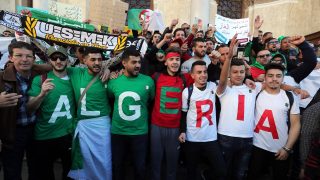Faced with financial pressure due to a massive drop in oil earnings and foreign exchange reserves, oil-dependent Algeria is looking to diversify funding sources by issuing Sukuk or Islamic bonds and developing its relatively young stock exchange.
The northern African nation largely depends on external resources from oil and gas exports despite several efforts aimed at diversification over time. Around 80 percent of the economy relates to hydrocarbons directly or indirectly.
Hydrocarbon prices started to fall in June 2014, but rebounded to nearly $80 a barrel in October 2018, and fell again toward the end of the same year. Official figures showed that revenue from the sector reached $30.25 billion in the first 11 months of 2019, over 14 percent drop from the same period a year earlier, while foreign exchange reserves fell by $10.6 billion in the last nine months.
Falling oil prices have reduced the hydrocarbon sector’s contribution to gross domestic product and foreign revenue, resulting in a deepening budget and trade deficit. Meanwhile, the non-energy economy also performed poorly over the past year as bad weather hit agricultural production and a protracted political crisis reduced business and consumer confidence. While real GDP growth, projected at around 1.9 percent in 2020, is insufficient in the medium term to tackle social protection and unemployment reduction.
The plan to explore alternative sources for capital is contained in a government document that reveals wider economic reforms that include “encouraging banks to diversify funding sources by developing the bond market and attracting money from the informal market,” Reuters reported.
Algeria will also focus on other funding such as Sukuk bonds while looking to develop the Algiers stock market into a major player in financing firms. The local bourse, established in 1999, is one of the world’s smallest and pales in comparison to its peers in neighbouring Morocco and Tunisia in terms of capitalization.
The ongoing reforms are part of those promised by President Abdelmadjid Tebboune, who was sworn into office in December despite widespread protests against his election. Spending cuts have been approved for the year, although subsidies for sensitive products such as basic foodstuffs, fuel, and medicine are untouched.
“The authorities have an ambitious plan of structural reforms with a view to streamline business regulation, improve governance and transparency, reform the pension system, and modernize the financial sector,” the African Development Bank said on Algeria in its African Economic Outlook 2020.
Algeria’s economy is expected to recover this year but it should be limited as economic fundamentals remain weak. According to experts at Focus Economics, several factors including a lack of investment in the hydrocarbon sector due to years of severe protectionist policies, large twin deficits, high unemployment among youth and political unrest will continue to weigh on economic dynamics.
AfDB projects that Algeria’s economic growth in the medium term will remain relatively stable, at 2.2 percent in 2020 and 1.8 percent in 2021, as contained in the bank’s regional outlook released late January.








